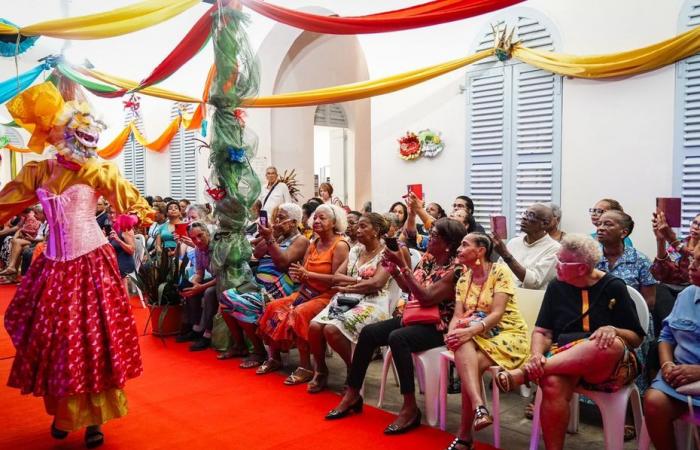This Friday evening, the Guyanese Regional Carnival Observatory is celebrating its 10th anniversary at Nana. Monique Blérald, president of the association, takes stock of the actions carried out. The doctoral student, professor at the university and also fourth vice-president within the Federation of Carnivals and Festivals of France, discusses the failure of the registration of touloulou as UNESCO's intangible cultural heritage.
•
©CB
What was the goal of the Carnival Observatory when it was created 10 years ago? ?
This is an association under the 1901 law, created in 2014. It brings together resource people from the world of carnival, academics, associations and carnival-goers. There were 10 of us at the start with a hard core of five people : Victor Clet, Armand Hidair, Fortuné Mécène, Aline Belfort and me. We had four objectives. The first : register the Guyana carnival with the character of the touloulou, dancing and street, as UNESCO's intangible cultural heritage. The second : serve as a transmission belt between institutions and carnival-goers. Our third objective was to understand the evolution of carnival, its codes, its symbols and its rites in connection with globalization and the influence of border regions, such as the Caribbean or Brazil. Last objective : enable intergenerational transmission based on research and tools in collaboration with the Minera laboratory (Intercultural migration and education in the Amazon) of the University of Guyana through symposia, conferences, exhibitions and the publication of works.
Before talking about the registration of the touloulou, let's come back to the other objectives. In 10 years, has the Observatory served as a link between the different actors ?
This objective was not achieved. We are, members of the association, carnival-goers. We hang out with them, we hear them. They may not be physically present, but we are encouraged by the people. What we missed was the public authorities. We feel alone. We left with strong goals, dreams. According to UNESCO criteria, we are asked for acts of deliberation from town halls : out of the 22 municipalities in Guyana, only six have taken it. something else : ten years after the creation of the Observatory, we still do not have premises. Our archives, our costumes are distributed among the different members. For the population, there is therefore no place that makes us visible.
Isn't this a lobbying problem? ?
I don't know. We made files and requests. The CTG (Territorial collectivity of Guyana, Editor’s note) offered us a room at EnCre but with daytime opening hours. However, we are volunteers and we meet in the evenings or on weekends. As a result, there is no place where the population can come and see us.
What about your transmission goal ?
We made publications : Masked ball from Guyana and elsewhere which I wrote with Mylène Danglades; these are conference proceedings. There is also Street songs: Guyana Carnival : Laguiann street carnival song. For this one, we worked with the students. We have had several exhibitions : on Henri Egalgi, on literature and carnival, on the evolution of touloulou. But even there, it is financially complicated to set up exhibitions. We have had help, notably from the local authority or the Macouria town hall, but the amounts are not incredible. Even for books, we have a problem : I asked the CTG to help me with the publication of the book on street songs but they gave me nothing. We had to pay 5 000 euros to the publisher. The laboratory, the observatory and the people who made the songs paid. We wanted to release new copies for the population, but we would have had to pay more.
The expected support was fragile
Monique Blérald, regarding what was missing from the application file for UNESCO registration
Let's return to your first objective : the registration of carnival and touloulou as UNESCO intangible cultural heritage. What went wrong ?
It is the lack of unity of the Guyanese and in particular of the politicians whose support we have not had. The expected support was fragile. I look, for example, at what has been done for the skiff in Martinique or for the big case in Guadeloupe : we saw buses, advertising panels in the city. This is not the case for touloulou in Guyana.
Let’s go back to the steps followed…
In 2017, we were included in the national inventory. This was the first step. We submitted the file which was accepted by the Ministry of Culture. This inscription allowed us to continue towards registration on the representative list of humanity. We continued the work on the ground with the Touloulou caravan to provide concrete evidence of the population's support for this project to show that all communities in Guyana, not just the Creoles, are affected by the carnival. We needed letters of support. We went to see businesses, town halls, but also schools to talk about the evolution of carnival.
When was your application refused? ?
We were interviewed in February 2024 at the Ministry of Culture. Before that, we had completed the application file with all our elements including the studies carried out by researchers in Guyana and the works. The objective of this stage was to represent France to UNESCO. We came in second place after Biou d'Arbois, a wine growing practice in the Jura. It is Biou who will represent France in 2026 because there can only be one candidate per country.
We're going to start everything from scratch and that's why we need everyone's support.
What are you going to do ?
We left, we will mobilize and update the file. We are going to start everything from scratch and that is why we need everyone's support.
What are you going to do differently ?
We will continue with the means at hand. What didn't work was that we didn't have a place for our archives and for the population to come and see us and help us. Afterwards, we would need a guide, an employee who could help us put together grant applications, someone who masters new technologies.
With all these difficulties, what keeps you going? ?
The Ministry of Culture encouraged us to continue, telling us that we had put together a good file and that we were not far away. The Directorate of Cultural Affairs of Guyana also helps us a lot. We must submit the file in 2026 to present a file in 2027. If it doesn't work there, we will give up.
You're celebrating ten years of the Observatory at Nana's this evening. Given what you just said, it seems like a half-hearted celebration.
The results are mixed because we do not have the expected support. We expect more from our elected officials. Starting with a room for our outfits and our archives.
There are also steps being taken to register Awara Bouillon as UNESCO's intangible cultural heritage. This would put you in competition…
That's what I say : broth is not yet listed as national heritage, touloulou is already further away. Let's finish the touloulou first, let's all work together to achieve our goal and then let's all work together for the registration of the broth wara.
©DR
The Ministry of Culture confirms that « States can only submit one national application every two years to UNESCO. An internal procedure at the Ministry of Culture has been put in place to supervise the selection of the national application submitted by France to UNESCO. The National Committee of ICH (Intangible Cultural Heritage, editor's note), placed under the General Directorate of Heritage and Architecture, examines the national applications in order to issue an advisory opinion for the Minister of Culture. On the basis of this opinion, the minister carries out an arbitration. »
Regarding the Guyana registration project, the Ministry of Culture specifies that “ the candidacy of “Carnival of Laguiaann ké so touloulou” was examined by the PCI National Committee on February 27, 2024. A delegation was heard on this occasion. The application was unfortunately not accepted for submission in 2025 and inscription on the Representative List of the Intangible Cultural Heritage of Humanity in 2026. » For the ministry, “ although safeguarding a festive event uniting the whole of Guyanese society is a great objective, it was felt that this application could still be further structured. This was his first appearance before this committee. »






